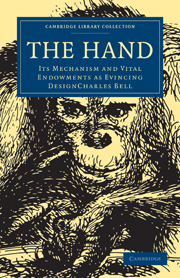Book contents
- Frontmatter
- PREFACE
- Contents
- CHAP. I INTRODUCTORY
- CHAP. II DEFINITION OF THE HAND
- CHAP. III THE COMPARATIVE ANATOMY OF THE HAND
- CHAP. IV OF THE MUSCLES OF THE ARM AND HAND
- CHAP. V THE SUBSTITUTION OF OTHER ORGANS FOR THE HAND
- CHAP. VI THE ARGUMENT PURSUED FROM THE COMPARATIVE ANATOMY
- CHAP. VII OF SENSIBILITY AND TOUCH
- CHAP. VIII OF THE SENSES GENERALLY INTRODUCTORY TO THE SENSE OF TOUCH
- CHAP. IX OF THE MUSCULAR SENSE
- CHAP. X THE HAND NOT THE SOURCE OF INGENUITY OR CONTRIVANCE, NOR CONSEQUENTLY OF MAN'S SUPERIORITY
- ADDITIONAL ILLUSTRATIONS
- APPENDIX
- Frontmatter
- PREFACE
- Contents
- CHAP. I INTRODUCTORY
- CHAP. II DEFINITION OF THE HAND
- CHAP. III THE COMPARATIVE ANATOMY OF THE HAND
- CHAP. IV OF THE MUSCLES OF THE ARM AND HAND
- CHAP. V THE SUBSTITUTION OF OTHER ORGANS FOR THE HAND
- CHAP. VI THE ARGUMENT PURSUED FROM THE COMPARATIVE ANATOMY
- CHAP. VII OF SENSIBILITY AND TOUCH
- CHAP. VIII OF THE SENSES GENERALLY INTRODUCTORY TO THE SENSE OF TOUCH
- CHAP. IX OF THE MUSCULAR SENSE
- CHAP. X THE HAND NOT THE SOURCE OF INGENUITY OR CONTRIVANCE, NOR CONSEQUENTLY OF MAN'S SUPERIORITY
- ADDITIONAL ILLUSTRATIONS
- APPENDIX
Summary
When one has to maintain an argument, he will be listened to more willingly if he is known to be unbiassed, and to express his natural sentiments. The reflections contained in these pages have not been suggested by the occasion of the Bridgewater Treatises, but arose, long ago, in a coarse of study, directed to other objects. An anatomical teacher, who is himself aware of the higher bearings of his science, can hardly neglect the opportunity which the demonstrations before him afford, of making an impression upon the minds of those young men who, for the most part, receive the elements of their professional education from him ; and he is naturally led to indulge in such trains of reflection as will be found in this essay.
So far back as the year 1813, the late excellent vicar of Kensington, Mr. Rennell attended the author's lectures, and found him engaged in maintaining the principles of the English school of Physiology, and in exposing the futility of the opinions of those French philosophers and physiologists, who represented life as the mere physical result of certain combinations and actions of parts, by them termed Organization.
That gentleman thought that the subject admitted of an argument which it became him to use, in his office of “Christian Advocate” This will show the reader that the sentiments and the views, which a sense of duty to the young men about him induced the author to deliver, and which Mr. Rennell heard only by accident, arose naturally out of those studies.
- Type
- Chapter
- Information
- The HandIts Mechanism and Vital Endowments as Evincing Design, pp. ix - xiiPublisher: Cambridge University PressPrint publication year: 2009First published in: 1833



